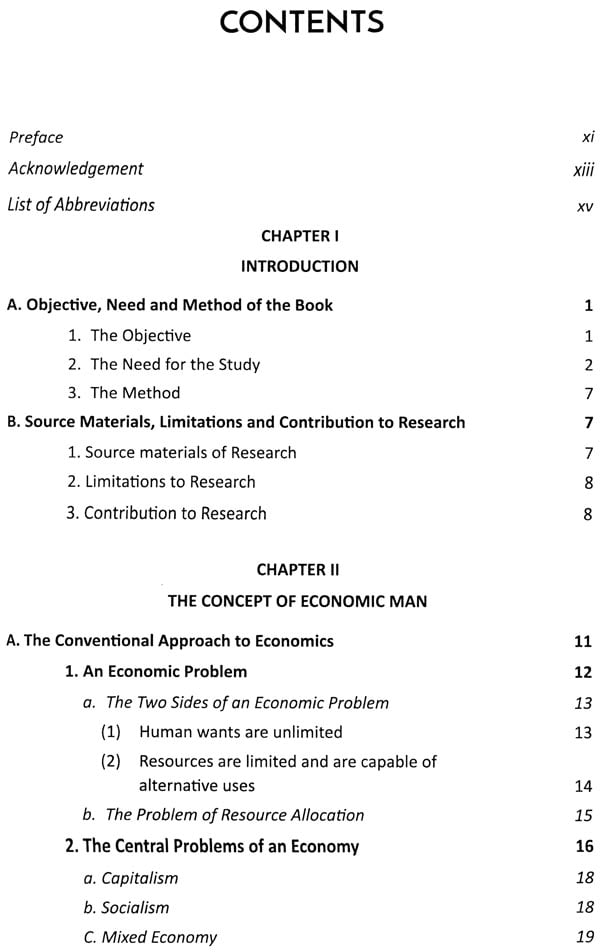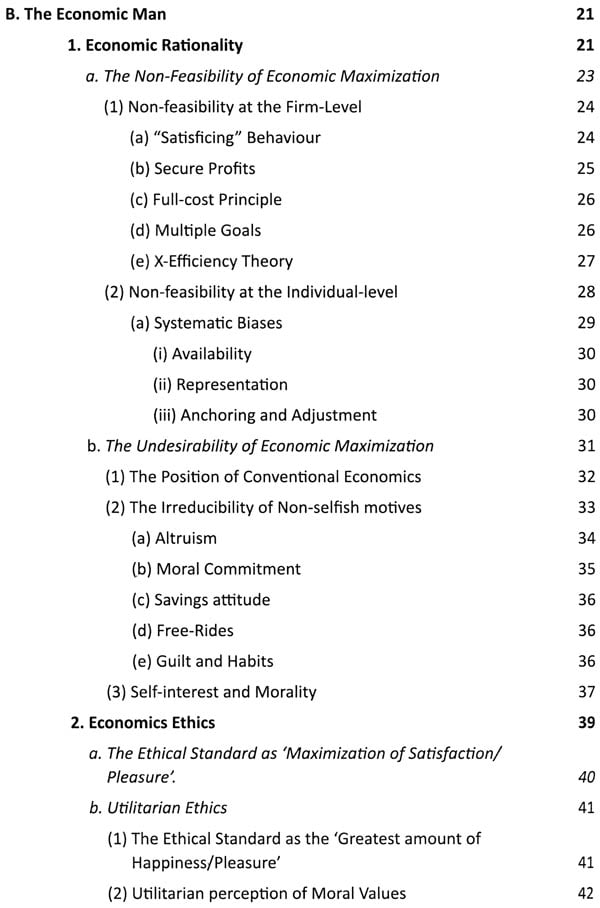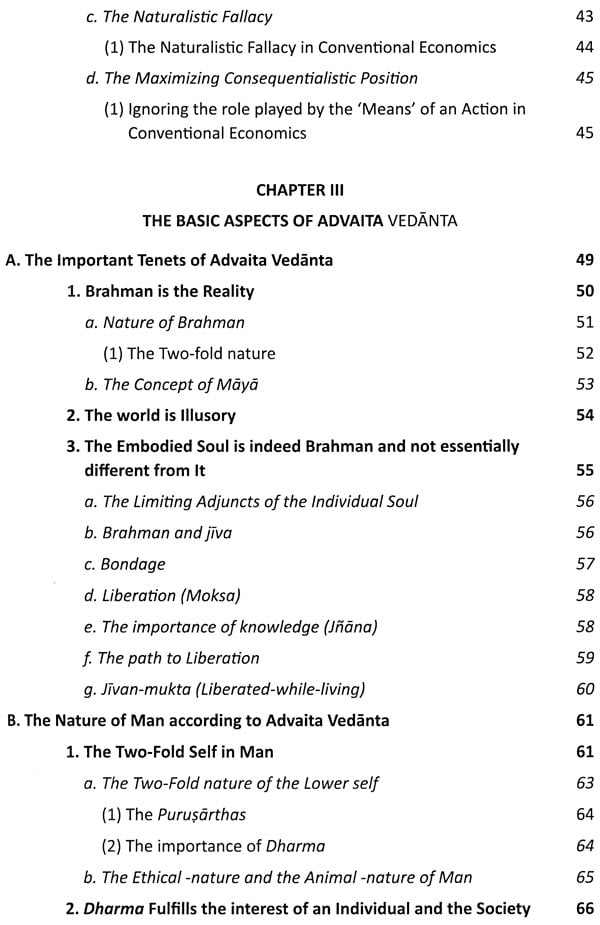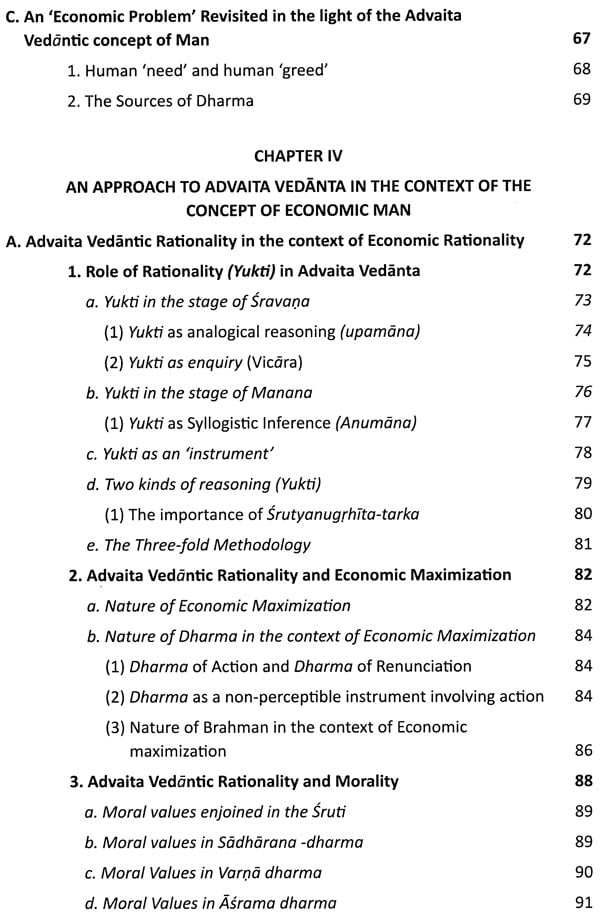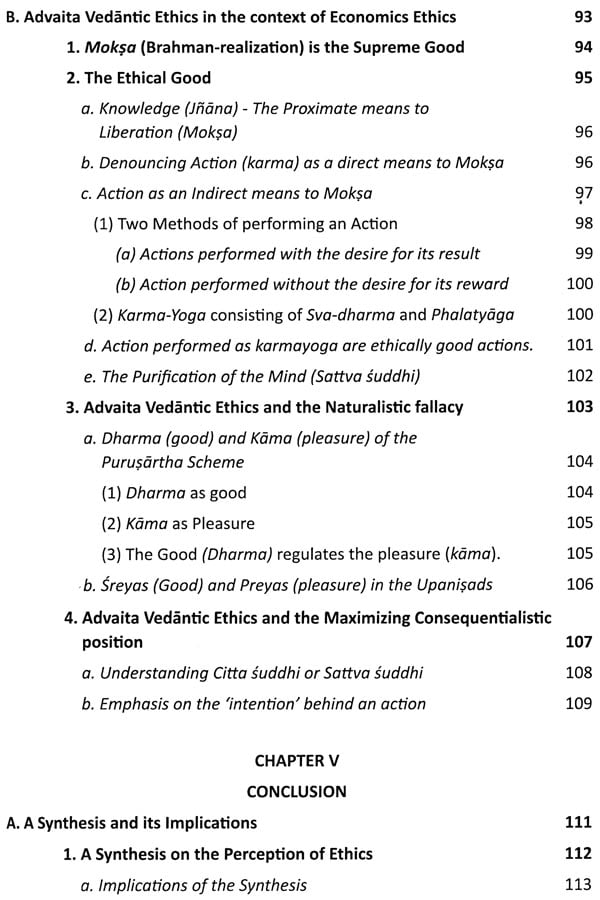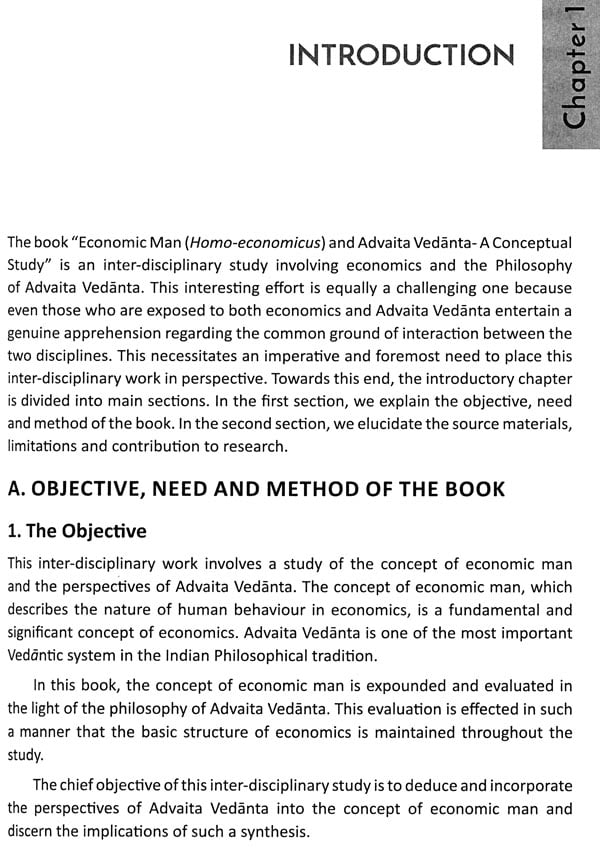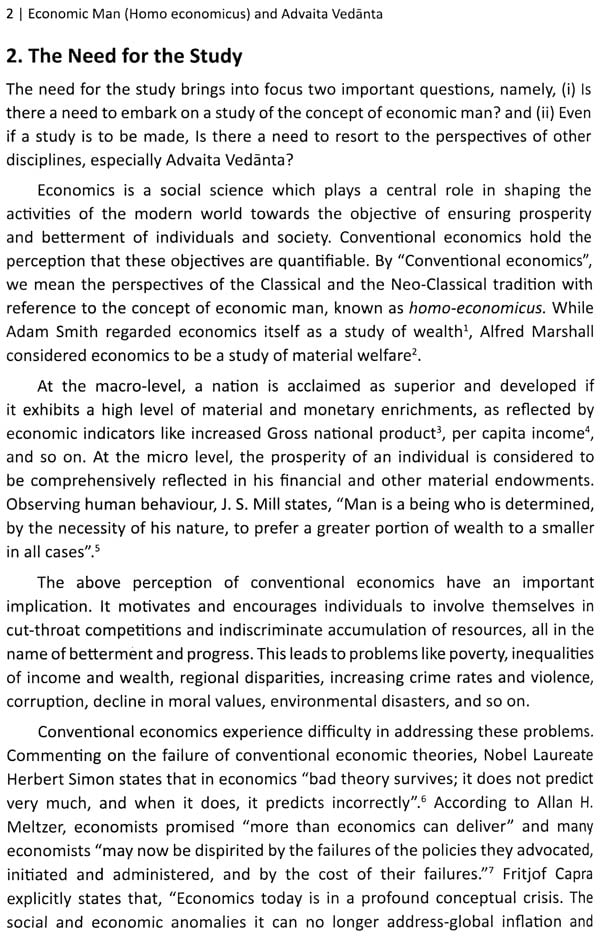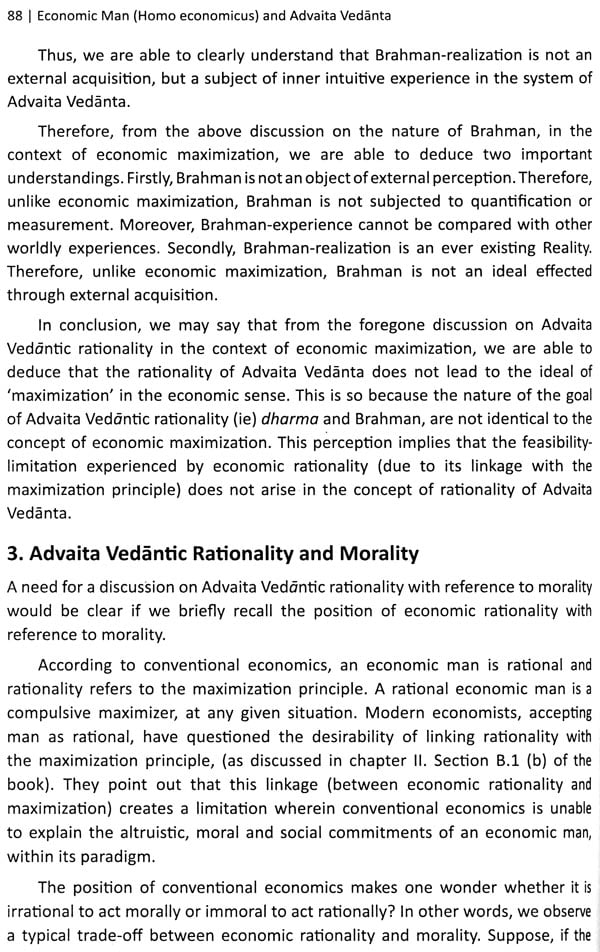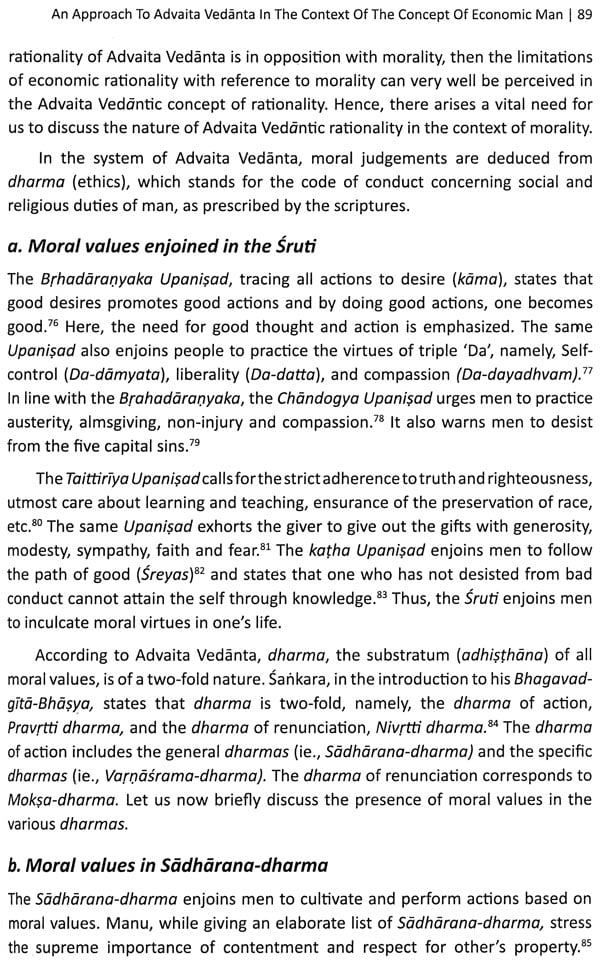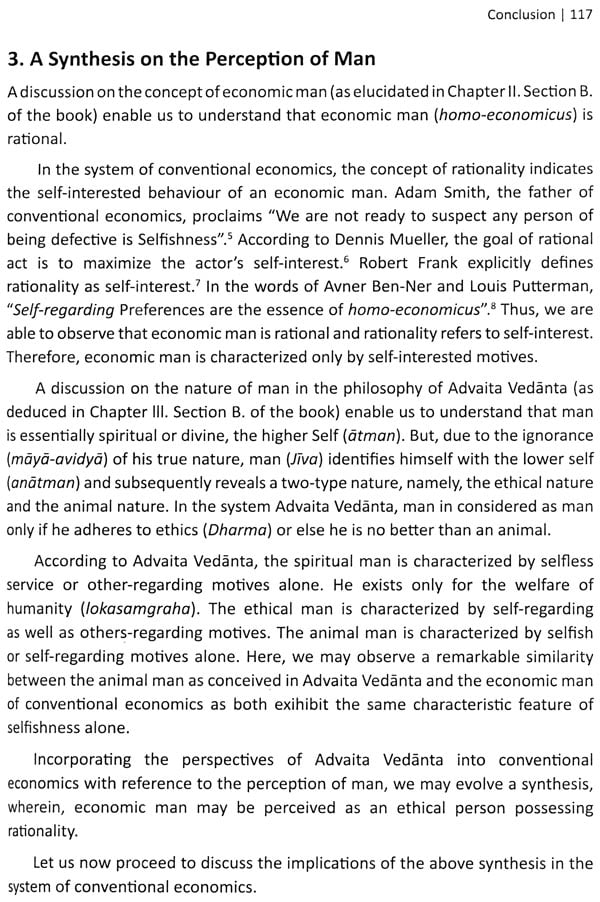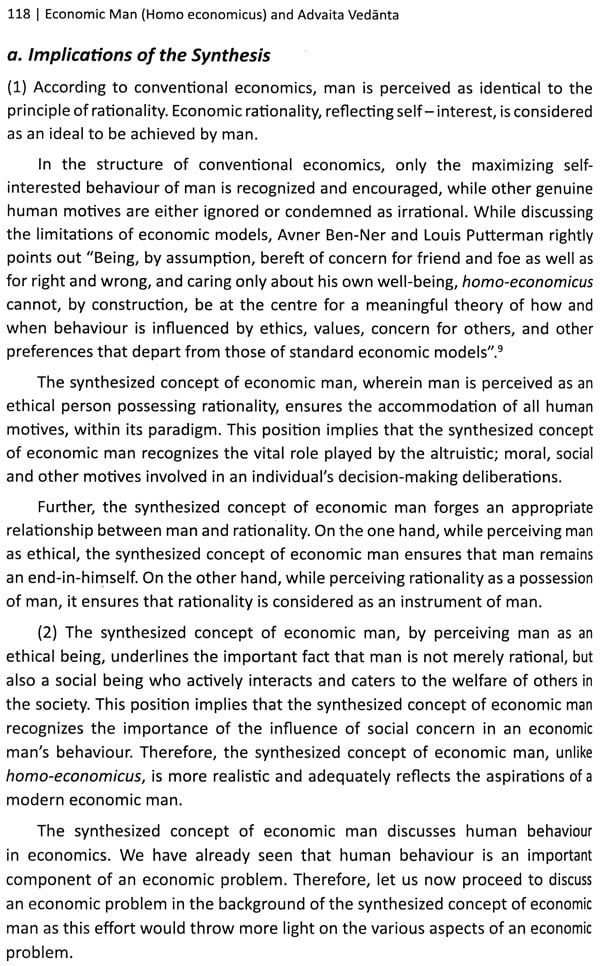
Economic Man-Homo Economic and Advaita Vedanta (A Conceptual Study)
Book Specification
| Item Code: | NAQ605 |
| Author: | K.S Sivakumar |
| Publisher: | Notion Press |
| Language: | English |
| Edition: | 2018 |
| ISBN: | 9781644291603 |
| Pages: | 180 |
| Cover: | PAPERBACK |
| Other Details | 9.00 X 6.00 inch |
| Weight | 200 gm |
Book Description
This book evolves a synthesized economic paradigm that accommodates the views of the conventional economists and its limitations expressed by the modern economists with reference to the concept of economic man (Homo economicus). As the concept of economic man is a fundamental/foundational concept of economics, any intervention to the foundation cannot be effective from 'within the system, the need for a different 'world-view' is in order. The synthesized economic paradigm is effected through the perspectives of Advaita Vedanta. As a result, the concept of economic man, overcoming its limitations, turns out to be more holistic and comprehensive, extending its horizon as well as that of economics. Economic models built on the synthesized economic paradigm would turn out not only to be theoretically and practically feasible, but more importantly, ethically validated models.
K.S. SIVAKUMAR is a faculty at the Department of Sanskrit and Indian Culture, Sri Chandrasekharendra Saraswathi Viswa Mahavidyalaya (SCSVMV), Enathur, Kanchipuram. He has a strong grounding in Economics from the R.K.M. Vivekananda College, Chennai, and in Philosophy, at the Dr. Radhakrishnan Institute for Advanced Study in Philosophy (RIASP), University of Madras. Sivakumar has twenty years of teaching experience in Economics, Soft-Skills and Indian Culture at affiliated Colleges, Business Schools and Deemed Universities. His research works are regularly published in reputed National and International Journals.
The concept of economic man (homo-economicus) is one of the fundamental/ foundational concepts of economics. Conventional economists (Classical and Neo-Classical economists) define 'man' and his/her behavior with the help of the concept of rationality. They hold the cardinal presupposition that: Economic Man is rational and 'rationality' in economics or economic rationality refers to the maximization behavior of an economic man, known as economic maximization.
Modern economists (those who oppose the views of the Classical and Neo-Classical economists) are in agreement with the conventional view that economic man is rational but disagree on linking economic rationality with the sole objective of economic maximization. By providing theoretical arguments and empirical evidences, they point out that in the modern, dynamic and uncertain world, individuals are unable to achieve economic maximization and they settle for less-than- maximization positions. Further, the sole objective of economic maximization ignores the non-maximizing objectives like altruism and moral commitments that play a vital role in an individual's decision-making behavior. Thus, modern economists bring out the constraints of non-feasibility and non-desirability of achieving economic maximization.
The non-desirability constraint begs a discussion on the ethical structure of economics. The ethical structure is based on the standard of economic maximization of satisfaction that explains all kinds of behavior in term of self-interest and hence, is unable to recognize the strong presence of altruistic and moral commitments of individuals. The two primary causes that limit the ethical structure are the identification of the 'good' with 'satisfaction/pleasure' and the maximizing consequentialistic position of economics.
The need to approach a different world-view arises due to the fact that since the concept of economic man is foundational to economics and various 'systems/ view-points' are evolved based on the foundation, it logically follows that as views (both conventional and modern) are themselves (the effects) based on the foundation (the cause), it cannot alter the foundation. Therefore, a different world-view is in order.
The whole task of Advaita Vedanta is to enable an individual to realize that he/she is indeed Brahman (atman) and not essentially the apparent person, characterized by a complex whole (anatman). In the process of elucidating this supreme truth, Advaita Vedanta meticulously analyses the dimensions and the inter-relationships of the biological aspect (ie., the body, mind, etc.) and the psychological aspect (ie., the three states of waking, dream and deep sleep) involved in the nature of man. This vision of Advaita Vedanta, which clearly elucidates the dynamic nature of an individual and his/her behaviour at different levels of his/her existence, promises to have an immense potentiality for economists to have a comprehensive and holistic understanding of the different aspects of the concept of economic man.
An approach to Advaita Vedanta with reference to the concept of economic man brings out perspectives of Advaita Vedanta that are compatible with the various dimensions of the concept of economic man and a synthesized economic paradigm is evolved. The synthesis is effected by incorporating the deduced perspectives of Advaita Vedanta in to the concept of economic man in such a manner that it overcomes the constraints involved (by including the views of conventional and modern) and at the same time, maintains the basic structure of conventional economics. The common areas of inputs interaction, from Advaita to economics, are: 1. On the perception of ethics, 2. On the perception of rationality, 3. On the perception of man, and 4. On the perception regarding the approach to conventional economics.
The synthesized economic paradigm extends the horizon of economics and models evolved from this would turn out to be not only theoretically and empirically productive/practical ones, but also ethically-loaded that fosters the welfare of the individuals and society.
**Contents and Sample Pages**
